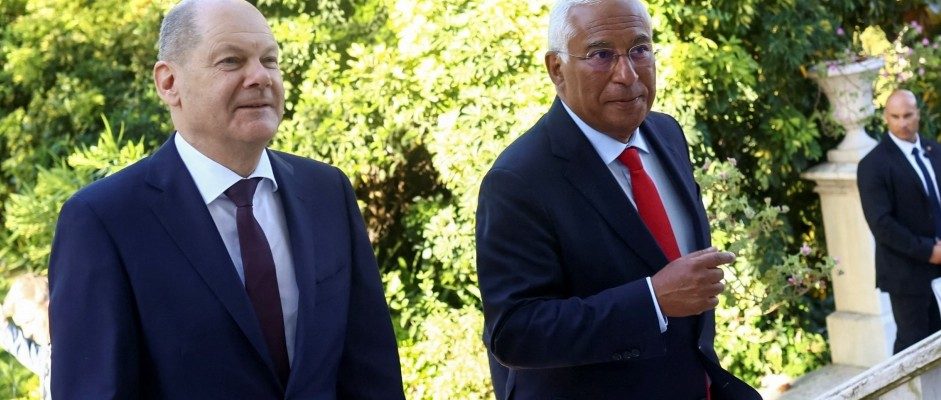The Luftwaffe Airbus, which was supposed to bring Olaf Scholz to Lisbon, had not even taken off from Berlin-Brandenburg Airport when the brief climate-political peace in the traffic light coalition was already over. Although reported Federal Minister of Finance Christian Lindner truthfully in the short message service Twitter, the federal cabinet has just passed the building energy law, with which the government wants to provide incentives for the replacement of millions of heaters in German cellars. At the same time, however, he let it be known that he considers the draft in its current form to be a mess: “I expect that the necessary changes will now be made in the parliamentary process in order to dispel concerns about financing and feasibility and to burden people as little as possible.”
The dispute within the coalition about climate protection, the energy transition, the question of how much can be expected of the citizens and how quickly – Scholz followed all of this to the Portuguese capital, 2300 kilometers away. The Federal Chancellor’s visit to his counterpart António Costa this Wednesday and Thursday also served the purpose of intensifying cooperation between the two countries on energy policy.
Portugal – in the euro crisis ten years ago one of Europe’s biggest problem children – can not only keep up with the supposed role model Germany when it comes to energy transition, it is even much further. Anyone who looks out of the window when approaching Lisbon, for example, will see more wind turbines than Markus Söder may ever build. On average, the country in the extreme south-west of the EU can cover around 60, and on some days even 100 percent of its energy needs from water, wind and solar power. In just a few years, green hydrogen should flow from Portugal to Germany via pipelines.
Nevertheless, Prime Minister Costa is also struggling with domestic political problems. Maybe that’s the reason why guest and host can’t stop praising each other as they stand in the garden of the magnificent Palais Sao Bento in the late afternoon and report on their conversations. Costa congratulates “dear Olaf” several times on how quickly he freed the Federal Republic from dependence on Russian gas supplies and completely realigned the German energy supply. The Chancellor also mediated the connection of Portugal and Spain to the European energy grid and thus made an important contribution to energy security in Europe.
Even in Lisbon, Scholz cannot flee from the coalition and its protagonists
Such words naturally flatter Scholz. He had previously described Costa as a “good friend”. It’s also no coincidence that the SPD chancellor is visiting his party colleague this week, because the Partido Socialista (PS) is celebrating its 50th birthday on Wednesday. This is also a reason for celebration for German Social Democrats, because the Portuguese Socialist Party was founded on April 19, 1973 by exiles in the Eifel town of Bad Münstereifel, specifically in the wine house “An den Rauschen”. The SPD, the party-affiliated Friedrich-Ebert-Foundation and the then Federal Chancellor Willy Brandt were among the midwives. His political great-grandson Olaf Scholz will also give the speech on Wednesday evening – an appointment that is probably not inconvenient for the chancellor in view of the ongoing dispute at home.
Scholz cannot flee from the coalition and its protagonists, even in Lisbon. He is asked what he thinks about the fact that FDP boss Lindner slid back into the building immediately after the building energy law was passed, as he stands in the garden of the Palais Sao Bento, lined with palm trees, rhododendron bushes and a marble pool. He cites the “Struck law,” the bon mot by former SPD parliamentary group leader Peter Struck, according to which no law comes out of the Bundestag the way it was sent in.
However, the government’s concept is very well designed, and “pretty much all cases that you can come up with” have been considered, says Scholz. He says this in view of the fears of many citizens that replacing the old heating system with an expensive new one could possibly overwhelm them financially. “Everyone can be sure that they will not be faced with an insurmountable task,” said Scholz.
For the incumbent coalition partners, the former chancellor’s party is to blame for the fact that many things now have to go hopplahopp
Interestingly, the chancellor fully agrees with his recalcitrant finance minister on this point – albeit perhaps for slightly different reasons. Lindner is bothered by the fact that the Greens are driving the energy transition with bans instead of market-based incentives and allegedly want to dictate to people which technologies they have to use in the future. Scholz, on the other hand, is concerned that citizens could opt out of the energy transition if they fear that they simply cannot afford the switch. Both chancellor and leader of the FDP keep slowing down the green coalition partner.
For the incumbent coalition partners, however, the blame for the fact that a lot of things have to go hopplahopp lies with the former chancellor’s party, the CDU: they are convinced that, under Angela Merkel, they have repeatedly decided on stricter limits for CO2 emissions, but never had the guts to explain to the citizens what changes this will bring for them personally.
Scholz, on the other hand, sees his own government on the rise again after the scramble of the past few months and the cleansing thunderstorm of the 30-hour coalition committee meeting at the end of March. According to the Chancellor, law after law will be introduced in the Bundestag in the coming weeks: “This is now a very productive, very forward-looking phase, which we also need for our country”. Exactly the same applies to the traffic light coalition itself.

